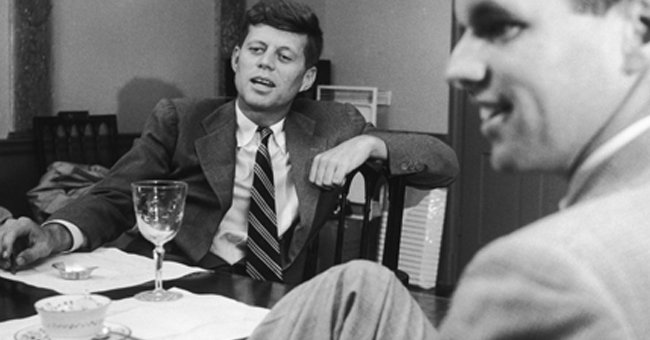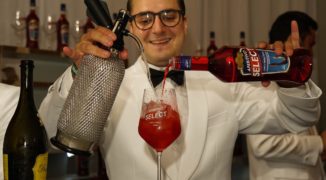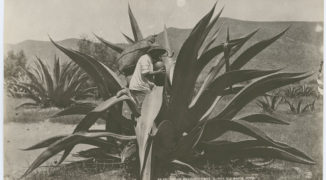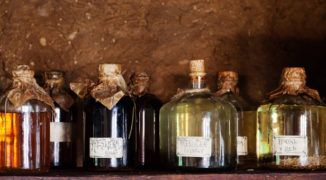As much as we hate to see it, campaign season is getting an unprecedentedly early start this go-round. We’ve got a long road ‘til November 8, 2016, and we’ve got a feeling we’ll be in need of a stiff drink or three to help us weather the tide. Luckily, we know we’ll be in good company. “Alcohol has always been part of the political scenario,” says Mark Will-Weber, author of “Mint Juleps with Teddy Roosevelt: The Complete History of Presidential Drinking.” “In fact,” he says, “it pre-dates America — George Washington used free booze to woo voters back when he ran for the House of Burgesses in colonial Williamsburg.”
Will-Weber makes a solid point: imbibes have certainly had quite an effect on the campaign trail and the White House. Heck, even in our country’s driest days, alcohol was welcome on Capitol Hill. (President Woodrow Wilson had quite the wine cellar, despite the Volstead Act.) In his book Will-Weber states, “Presidents … drink for many of the same reasons most people drink. They drink in celebration or to be sociable; they drink to confirm solidarity. They drink because they are under pressure or because they might feel lonely, depressed, or trapped. They drink because their job seems to demand it.”
So as we prepare for the impending election season, we’d like to pay homage to the drinks that have helped shape our country — for better and for worse.
1. Mt. Vernon Whiskey
As Will-Weber mentioned, President Washington was well aware of alcohol’s power as a social lubricant — even in the most tense political situations. In his General days, Washington was known to distribute alcohol amongst his troops, and handed it out jovially to win over voters. Most interesting, a mere three years after the Whiskey Rebellion, Washington himself got into the whiskey distilling business. Together with his distiller, Thomas Anderson, President Washington had quite a humming business going, at its peak distilling 12,000 gallons a year, and setting the tone for the political importance of the spirits industry in the process.
2. Hard Cider, Compliments of President William Henry Harrison and the Log Cabin Boys
President Washington may have set the precedent for using alcohol to help win over the proletariat, but President Harrison and the Log Cabin Boys of the Whig party took imbibing on the campaign trail to a whole new level. Using hard cider as an appeal to the “common man” while campaigning, the Whigs positioned Harrison as a man of the people by offering up endless amounts of cider preceding Harrison’s speeches, all while accusing the “privileged” incumbent President Van Buren of being removed from the people and drinking champagne. By the time Harrison made his campaign speeches, the audiences were pretty, well … lubricated. It would be easy to levy that without hard cider, Harrison wouldn’t have made it to Capitol Hill.
3. Bourbon Whiskey, According to President Taft
Not just any president gets inducted into the Kentucky Bourbon Hall of Fame. In fact, there’s only one who’s had the honor: President Taft. When the Pure Food and Drug Act was passed in 1906, it caused quite a commotion amongst distillers who argued over what could be considered “Kentucky Bourbon Whiskey.” The issue went to court and stood at a stalemate for three years. Finally, in 1909, President Taft passed the legislation which clarified the various categories and differences between “straight,” “blended,” and “imitation” whiskeys. His regulations are still the industry standard today.
4. FDR, & the Lesson in a Bottle of Napoleonic Brandy
You’d think that if we’re talking about FDR and imbibes, we’d have something to say about the debut of Budweiser’s Clydesdale Wagon upon the repeal of prohibition. Or maybe you’d think we’d mention his love of beer and late night poker games, but during FDR’s tenure as president it was actually a bottle of brandy that proved to be the game changer. This specific bottle of Napoleonic-era brandy was shared by the president and New York business man Alexander Sachs in 1939. Alexander accompanied their drinks with a cautionary tale: Napoleon had once been approached with the idea of constructing a fleet of combat-ready steamships, but he couldn’t be compelled to develop the technology. Shortly thereafter, Waterloo happened. Thusly, FDR was persuaded to pursue the development of the atomic bomb.
5. JFK’s Election Night Daiquiris and the Kennedy Alcohol Fortune
Joe Kennedy’s fortune was reaped through a variety of different business ventures, the better portion of which had to do with alcohol. More specifically, during his tenure as British ambassador and on the eve of the repeal of Prohibition, Joe made some pretty strategic business decisions dealing with Scotch whiskey. It’s precisely those millions that bank-rolled his son’s presidential campaign and eventually landed JFK in the White House later down the line. That all being fine and well, it wasn’t Papa Joe’s scotch you would’ve found Jack and Jackie sipping on the night the election results came in. Nope, that night the two drank daiquiris.
Bonus Punchline: Andrew Jackson’s Party Punch and Indoor Plumbing at the Whitehouse
Personally, I don’t have a lot to thank Andrew Jackson for, but one contribution we can all be grateful for is his decision to install indoor plumbing at the White House. What prompted him to do it? Well, the inaugural festivities got a bit out of hand due to the abundance of some rather potent orange punch, which Dave Wondrich reconstructed with Cognac and oleo-saccharum. Dare we say the party’s aftermath was a bit of a … shit show?





